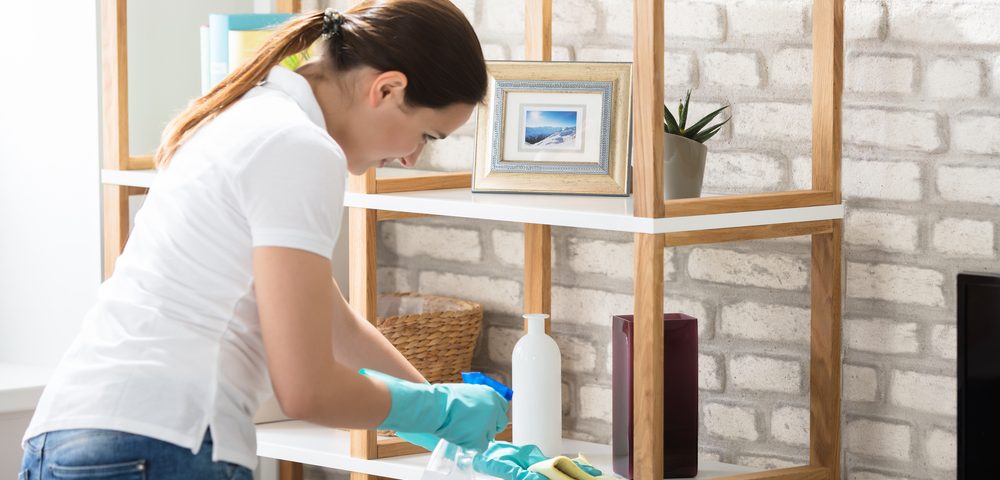Tidying Tips for Low-energy Days

We all have those days with CF when the coughing is nonstop and the energy has fizzled long before the clock sounds noon. Unfortunately, low-energy days don’t magically retract our responsibility to lend a hand around the house. Maybe you are a parent chasing chaotic babies and tripping over blocks and books (like me) or a roommate expected to share in the duty of maintaining your own space. We all have to manage, somehow, some way.
Following are some tidying tips for those low-energy days and beyond to help encourage organization and cleanliness without exacerbating fatigue.
Never leave a room empty-handed
If I had to pick one tidying tip that has been most beneficial in my transition into being a parent with limited energy, this one takes the prize: Never leave a room empty-handed. It is simple, yet effective. Essentially, before leaving a space, you scan the room to identify any misplaced items that could be returned or put where they belong in the area of the house you intend to go next. You can save a lot of energy by being aware of your surroundings, and therefore intentional about the trips you make from room to room.
For example, if a dirty coffee cup or nebulizer cup is on my nightstand, I might grab it on the way downstairs to the kitchen to feed my son breakfast. This way I am not wasting energy by making an additional trip up and down the stairs to grab a single coffee cup. I use my energy in a much more efficient way and the clutter gets put away little by little throughout the day.
Only touch things once
This one is for all the “pilers” out there like me. A “piler” is someone who puts things into piles because they aren’t sure what to do with the item or they intend to find its “home” later. Pilers have good intentions, but consequently, the piles grow and grow to the point of clutter and disorder.
Every time I pass a pile, I remember another task that needs my attention and I feel stressed. Currently, I am focusing on touching an item only once, deciding what to do with it immediately, and not placing it in a temporary home or pile. Sometimes that means putting a dirty coffee cup in the dishwasher instead of on the counter, sorting the post, and trashing junk mail immediately, or putting away the box of tissues in the bathroom cabinet versus the kitchen table while unloading the groceries.
It can be difficult to muster the extra energy to find the item a home at that moment. However, I have realized that it helps limit my stress to deal with it and be done, essentially removing the “I need to put that away” guilt that can almost be more mentally exhausting.
Prioritize what needs to get done
On some days, I just don’t have the energy to check every item off my to-do list. Heck, on those hard days, I’m lucky to check off one. And it’s usually something lame: refill the soap dispenser, for example. Living with CF is a full-time job that requires continuous attention, both physically and mentally. That’s why it’s important to prioritize what absolutely needs to get done and focus on a minor theme of tasks after fulfilling CF-specific responsibilities. That could be focusing on laundry for the day, tidying the kitchen, or restocking the toilet paper or paper towels, etc.
When ranking your to-do list, whatever tidying doesn’t get done that day can wait until tomorrow. Move the remaining tasks to the front of the list for the following day when you can recharge and tackle them head-on. By the end of the week, you will have accomplished more than you realize by slowly chipping away at the list. The dirty laundry will be just fine sitting unwashed for an extra day if it means putting your health first and resting when needed — I promise.
***
Note: Cystic Fibrosis News Today is strictly a news and information website about the disease. It does not provide medical advice, diagnosis, or treatment. This content is not intended to be a substitute for professional medical advice, diagnosis, or treatment. Always seek the advice of your physician or other qualified health provider with any questions you may have regarding a medical condition. Never disregard professional medical advice or delay in seeking it because of something you have read on this website. The opinions expressed in this column are not those of Cystic Fibrosis News Today, or its parent company, Bionews Services, and are intended to spark discussion about issues pertaining to cystic fibrosis.








Leave a comment
Fill in the required fields to post. Your email address will not be published.